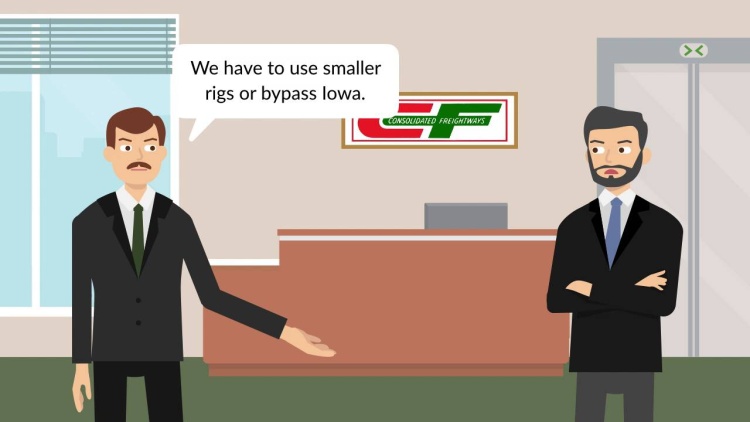Kassel v. Consolidated Freightways Corp.
United States Supreme Court
450 U.S. 662, 101 S. Ct. 1309, 67 L. Ed. 2D 580 (1981)
- Written by Megan Petersen, JD
Facts
Consolidated Freightways Corp. (Consolidated) (plaintiff) was a trucking company with routes that included shipping goods through Iowa. Consolidated used both semi (one trailer) and twin (two trailers) trucks in its operations. Consolidated preferred to use 65-foot-long twin trucks because they could transport more goods at once. An Iowa state law, however, prohibited the use of most trucks longer than 55 feet within the state’s borders. Consolidated could either use other trailer options, detach its trailers at the Iowa border, or divert its trucks around the state. Consolidated was not satisfied with these options and filed suit against Kassel (defendant), the state official responsible for enforcement of the Iowa statute, in federal district court on the ground that the Iowa state law unconstitutionally burdened interstate commerce. Iowa defended its law on the ground that it was necessary for highway safety. The district court concluded that there was no difference in safety between a semi and a twin truck and held the Iowa law unconstitutional. The court of appeals affirmed, and the United States Supreme Court granted certiorari.
Rule of Law
Issue
Holding and Reasoning (Powell, J.)
Concurrence (Brennan, J.)
Dissent (Rehnquist, J.)
What to do next…
Here's why 910,000 law students have relied on our case briefs:
- Written by law professors and practitioners, not other law students. 47,100 briefs, keyed to 997 casebooks. Top-notch customer support.
- The right amount of information, includes the facts, issues, rule of law, holding and reasoning, and any concurrences and dissents.
- Access in your classes, works on your mobile and tablet. Massive library of related video lessons and high quality multiple-choice questions.
- Easy to use, uniform format for every case brief. Written in plain English, not in legalese. Our briefs summarize and simplify; they don’t just repeat the court’s language.





